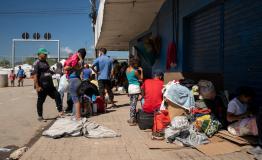

Brazil
Brazil, a diverse and populous country with very uneven access to healthcare across its vast territory, was the second-worst affected by COVID-19 in the world in 2020. By the end of the year, almost 200,000 people had died of the disease. Hundreds of MSF staff, most of them Brazilians, responded to the crisis.
It is almost 30 years since MSF first arrived in Brazil, to respond to a cholera outbreak in the Amazon region. Since then, we have provided support to indigenous communities, migrants, slum dwellers and victims of socio-environmental catastrophes across the country.

6,490
6,49
1,080
1,08
In 2020, we ran projects in seven states (São Paulo, Rio de Janeiro, Amazonas, Roraima, Mato Grosso do Sul, Mato Grosso and Goiás). In addition to an intense field activity, we worked to disseminate messages to people, emphasising the importance of hygiene and physical distancing measures.
Unfortunately, some government officials acted in an uncoordinated, or even antagonistic, way, compromising adherence to the measures necessary to curb the spread of the disease, which ultimately undermined our efforts. The first case of COVID-19 was reported on 26 February in the city of São Paulo.
At first, it affected the most affluent areas, but it was not long before it spread to poorer neighbourhoods of large cities. Vulnerable people from urban regions were the initial focus of MSF’s activities, which started on 1 April in São Paulo.
Brazil has a universal public health system, known as SUS, offering free care at all levels. However, marginalised groups such as the homeless, drug users, migrants and refugees, indigenous communities, and inmates in prisons and detention centres have little access to SUS, and they were hard hit by the pandemic.
For this reason, MSF decided to prioritise these groups, concentrating initially on the homeless in São Paulo and, shortly afterward, in Rio de Janeiro.

COVID-19 in Amazon region
1 year of COVID-19 interventions: MSF and municipal health system staff arrives at a community on lake Mirini. The teams leave the vessel of the primary healthcare boat to carry out routine screening and vaccination from house to house.
With the growing demand, we began to work in isolation centres in central São Paulo. These facilities, run by the local authorities and partly staffed by MSF personnel, gave homeless people with the virus a safe place to stay while they recovered.
Later, we sent a team to strengthen the capacity to treat critically ill patients in the intensive care unit at Tide Setúbal hospital, a facility on the eastern outskirts of the city. In addition, we carried out comprehensive health promotion work, contact tracing, and testing in Jardim Keralux and Jardim Lapena neighbourhoods, referring patients to health centres or to the hospital if necessary.
Subsequently, we launched a palliative care project at the same hospital that is considered somewhat pioneering, given the taboo nature of the topic and the limited availability of palliative care in the country’s public health system.
As the pandemic spread, signs of saturation began to appear, as hospitals became overcrowded and demand grew for more complex treatments, requiring intensive care.
The first place to experience the tragic effects of the collapse of its health system was Manaus, the capital of Amazonas state, which was already suffering from a lack of medical resources before COVID-19 hit. As cases surged in the city, hospitals were unable to cope with the increasing demand for intensive care unit beds.
MSF boosted the capacity of the health system, managing 48 beds for severely and critically ill patients at 28 de Agosto hospital. Our teams supported health facilities in two other locations in the state, Tefé and São Gabriel da Cachoeira, several days’ journey upriver from Manaus.

COVID-19 São Paulo
MSF evaluates and screens homeless people in shelters in downtown São Paulo. Activities also include health promotion.
The COVID-19 crisis also affected the northern state of Roraima. MSF has worked in the state since 2018 to support the fragile health system, which has been further stretched by the arrival of a large influx of Venezuelan migrants.
While continuing our regular medical and mental health activities, we began to screen for suspected cases and carry out health promotion in migrant hotspots. When the local health system was overwhelmed, an MSF medical team staffed a field hospital that had been built by the authorities to expand the capacity for COVID-19 patients.
Our staff treated both local people and migrants at the facility. In Mato Grosso do Sul state, we carried out specific activities aimed at the indigenous community, including screening, health promotion, and improving water supply. We also supported the regional hospital in Aquidauana city, strengthening protocols and infection prevention and control measures.
In the same state, we provided medical assistance to male and female inmates and staff at two prisons in Corumbá city. In addition, we trained health workers in Goiás and Mato Grosso states. At the end of 2020, we continued to monitor the evolution of the virus.
We returned to Tefé and São Gabriel da Cachoeira in Amazonas following a rapid rise in cases and deaths. It was not yet possible to envision a clear pattern for the trajectory of the pandemic in Brazil, but we remained alert to responding to changes in it while trying to apply the lessons learned during the year.
No. staff in 2020: 125 (FTE) » Expenditure in 2020: €5.5 million MSF first worked in the country: 1991

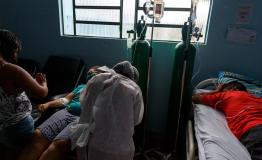
Failed COVID-19 response drives Brazil to humanitarian catastrophe
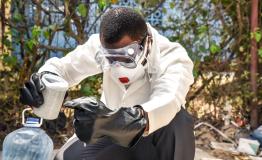
MSF: Governments must demand pharma make all COVID-19 vaccine licensing deals public
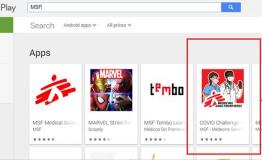
MSF challenges COVID-19 myths with new quiz challenge app
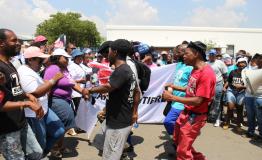
MSF and TB activists disrupt opening of TB conference to protest drug corporations keeping life-saving medicines from people
